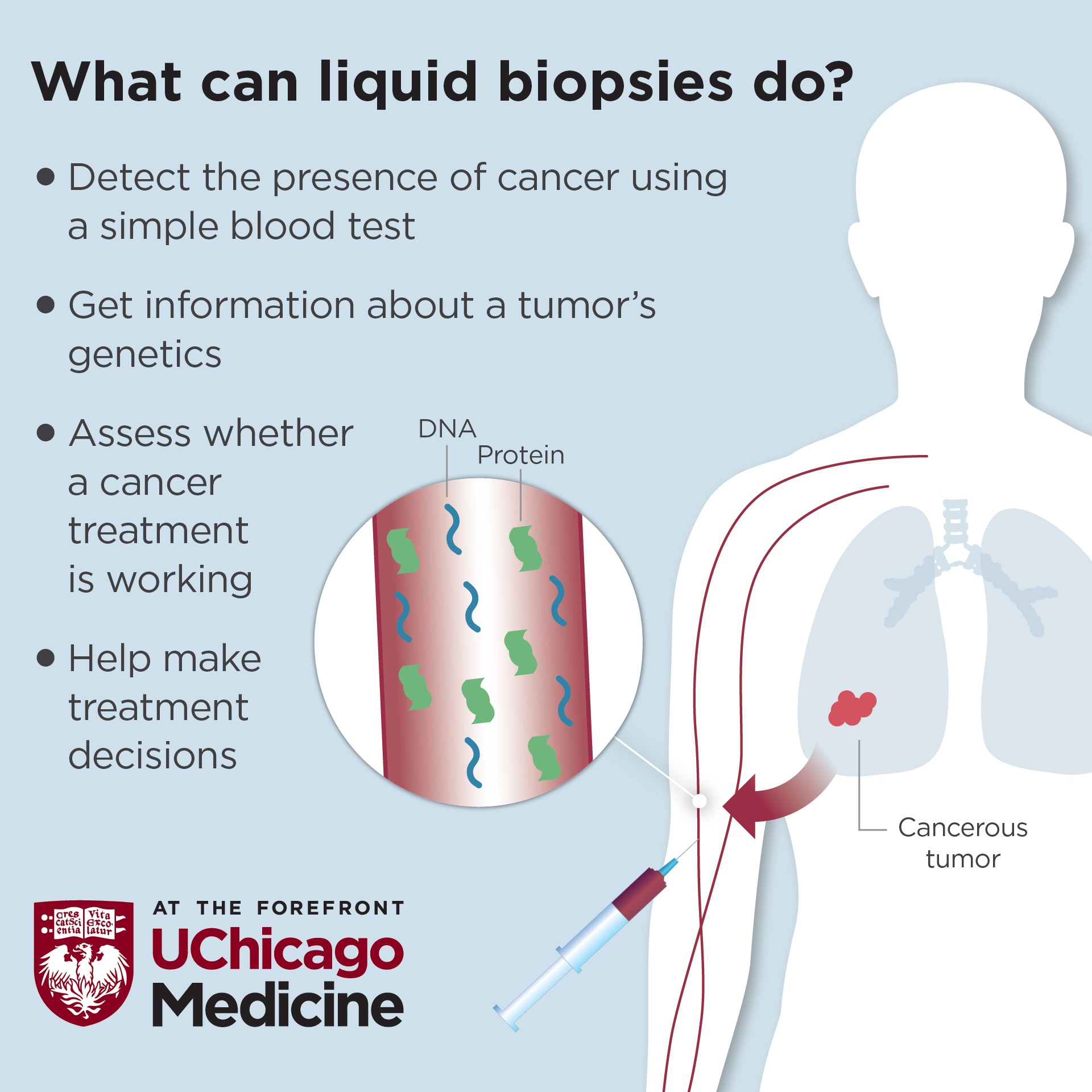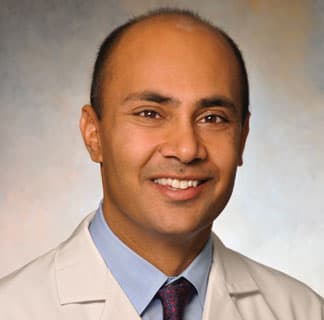Liquid biopsy: A new tool for identifying and monitoring cancer

Physicians at the University of Chicago Medicine are increasing their use of liquid biopsies, an emerging technology that detects signs of cancerous tumors with a simple blood test rather than an invasive needle procedure.
While a needle-based biopsy remains the gold standard for both diagnosing cancer and testing a tumor’s genetics, UChicago Medicine oncologists see promise in this faster, safer and effective test, especially for patients with metastatic cancers who need multiple biopsies during and after treatment.
“Liquid biopsy can be a noninvasive way of assessing how well a patient is responding to treatment, and even guiding in real-time treatment de-escalation,” said Ari Rosenberg, MD, a UChicago Medicine oncologist who specializes in head, neck and thyroid cancers.
What is a liquid biopsy?
When cancer tumors grow, most shed tumor DNA into the bloodstream. A liquid biopsy can identify that DNA in the blood and relay valuable information about a tumor’s genetics, indicating whether a treatment is working.
“It’s useful in people who already have a cancer diagnosis because we know the DNA mutations present in their tumor from the original biopsy, and we know what we’re detecting in the liquid biopsy is actual tumor DNA,” Rosenberg said.
UChicago Medicine physicians recently expanded the use of liquid biopsies to include head and neck cancer patients, in addition to patients with advanced lung, colon, breast and gastrointestinal cancers. For now, it’s used as a complementary diagnostic tool to needle biopsies.

Pros and cons of liquid biopsy
A blood test is more convenient and less costly than a needle biopsy, which often involves an ultrasound or CT scan, and in some cases, anesthesia.
Another major benefit of liquid biopsy is that results come back in about a week — two to three times quicker than it takes to get genetic information from tissue biopsies, said UChicago Medicine thoracic oncologist Christine Bestvina, MD.
“This helps patients get treatment faster. We have evidence behind that,” Bestvina said. “It helps identify more patients who can benefit from targetable medicine. With cancer, turnaround time is extremely important.”
Still, liquid biopsies aren’t right for every patient. Certain cancers — such as early-stage cancers, small cell lung cancer and gynecological cancers — don’t shed much DNA and therefore don’t provide useful information, Bestvina said.
Some patients have unique DNA that can skew test results, making false positives a possibility. And any cancer detected in a liquid biopsy still might need follow-up with a regular biopsy.
The future of liquid biopsy
Promising research is now being done on liquid biopsies at UChicago Medicine and other sites nationwide, including a version for pediatric cancers. The multiple clinical trials now under way at UChicago Medicine are focused on using liquid biopsy for other types and earlier stages of cancer.
These advancements will not only help detection of a cancer recurrence, but also make treatment more personalized, Rosenberg said.
In one UChicago Medicine clinical trial, for example, liquid biopsies are being evaluated for optimizing and personalizing immunotherapy-based treatment for recurrent, metastatic head and neck cancer patients. It could help identify which patients only need immunotherapy, versus patients who may need it combined with other treatments. This has potential to improve how well immunotherapy works while minimizing the side effects of treatment.
“Soon we’ll use liquid biopsies to identify which patients are becoming resistant to treatment and guide us to switch to a different treatment,” Rosenberg said.
Another biopsy alternative — a saliva-based molecular test to detect and diagnose oral cancers — was recently developed by a team of specialists including UChicago Medicine’s co-director of Head and Neck Surgical Oncology, Nishant Agrawal, MD, and researchers Evgeny Izumchenko, PhD, and Rifat Hasina, PhD.

UChicago Medicine Comprehensive Cancer Center
UChicago Medicine is designated as a Comprehensive Cancer Center by the National Cancer Institute, the most prestigious recognition possible for a cancer institution. We have more than 200 physicians and scientists dedicated to defeating cancer.
Learn More About the Comprehensive Cancer Center
Nishant Agrawal, MD
Nishant Agrawal, MD, specializes in treating benign and malignant tumors of the head and neck. He serves as section chief of otolaryngology - head and neck surgery as well as director of head and neck surgical oncology.
Read Dr. Agrawal's physician profile